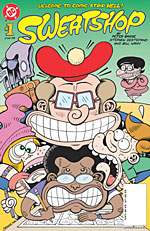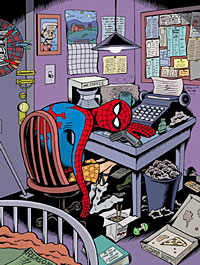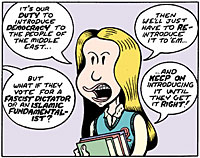>> The Book Review: The Horde
>> What About Bob? An interview with Bob Schreck, Part Two
More...

Peter Bagge is one of the best known and most accomplished cartoonists in America. His work in the '80s, which included taking over editing WEIRDO from Robert Crumb and his Fantagraphics series NEAT STUFF, THE BRADLEYS and JUNIOR are legendary. But it was the thirty-issue run of HATE from 1990-1998 and it's main character Buddy Bradley, for which he's best known.
Since then, Bagge has worked on developing a HATE animated series, made a number of web cartoons, and wrote a short-lived DC comic YEAH, in addition to continuing HATE in a series of annuals, and drawing monthly editorial cartoons for Reason Magazine. He's currently writing (and sometimes drawing) SWEATSHOP, a monthly comic from DC that will end with issue #6. According to Bagge, the impetus for SWEATSHOP came from DC editor Joey Cavalieri.
"He edited the BIZARRO book, which did pretty well, I guess. He wanted to do something different and he called me and brought up the idea of doing something. I spent some time thinking of a project that might be acceptable and never really came up with anything that might work. And then we met face to face for the first time in New York and over lunch we were trading stories of cranky old time cartoonists and the idea sort of snowballed from there.
 "I didn't want it to just be about old men, so as it evolved, and I started thinking up other characters, it became more of a satire of comics in general, and the industry, and from there came the idea of the sweatshop atmosphere, and that all the people working there are different types of cartoonists, which lets us make fun of all that. And from there it just
seemed natural to have staff members comment on events with their own cartoons when we had room for it.
"I didn't want it to just be about old men, so as it evolved, and I started thinking up other characters, it became more of a satire of comics in general, and the industry, and from there came the idea of the sweatshop atmosphere, and that all the people working there are different types of cartoonists, which lets us make fun of all that. And from there it just
seemed natural to have staff members comment on events with their own cartoons when we had room for it.
"We originally talked about me doing the artwork or at least pencilling it, but DC demanded a monthly schedule, so that was out. It was tricky, though, because they wanted it in my style and so we tossed around a lot of names. Most of the people I know are alternative cartoonists who either wouldn't be into copying my style on something like this or they couldn't handle a monthly schedule.
"Joe Cavalieri knew Stephen DeStefano and also knew Bill Wray, who's a really adaptable artist, and so he was the natural to do the sketchbook stuff. DeStefano chafed at the workload, though, so he left and we tossed around other names.
"I mentioned Stephanie Gladden who's an animator who works for the Cartoon Network. We had met because she was a big fan of HATE and comics are her first love, but she could only do so much because she's doing the book on top of her full time job. So we brought in Brian Sheridan and then Johnny Ryan who pencilled and inked a story for #4 and then #6.
"And I drew all of #5 because it was one large story. Of course it's already cancelled and so #6 will be the last issue. The big question is why, cause I guess it wasn't selling that bad, but who knows."
Bagge built up a significant audience in the '90s with HATE, only to go on to create two very different comic books for DC. Does he still hold on to that HATE audience?
"Apparently. The HATE ANNUALS sell well for an alternative comic. Though not as well as Hate did at the end, which I guess means people will buy any old garbage I'll put out. The audience isn't as easily identified as it was back in the early '90s, cause there was always a big range of people, but the core group was always grunge slacker types and they've grown up and gotten married and don't go into comic shops anymore.
'No-one wants to read about being a middle class middle aged American.' "Most of my communication with my audience comes from people who read my comic in Reason Magazine. It runs every month in the magazine and then the following month they put it online. I also do the occasional feature for them. But most of the feedback I get nowadays comes from people who read that."
There had been rumours that Bagge was writing and drawing a Hulk comic to be released in conjunction with the movie, a follow up to his Ayn Rand-inspired take on Spider-Man in the one-shot THE MEGALOMANIACAL SPIDER-MAN. Then there were rumours that the book had been cancelled, and now the HULK movie has come and gone. So what's the reality?
"The Hulk one shot is coming out in December," Bagge confirms.
"It all came about because of Axel Alonso, who's an editor at Marvel and used to be an editor at Vertigo, but he's really interested in doing something different and blurring the distinctions between alternative and mainstream comics. Of course, he has to deal with the whims of higher-ups who say 'oh that sounds fun', and then the next day, 'oh no, none of that'.
"[THE INCORRIGIBLE HULK] almost didn't happen even though SPIDER-MAN sold very well for a Peter Bagge comic, but just okay for a Spider-Man comic, especially in the wake of the movie. Some people got cold feet over the idea, but Axel fought for it and prevailed.
"When I was a kid and Marvel was all the rage, I liked some of the ideas behind them. That Peter Parker was this troubled and confused kid who was also a superhero. But I also thought he had the ugliest costume, so I just couldn't get into him. I also liked the idea behind the Hulk; of course he's just Dr Jekyll and Mr Hyde. And I really liked Jack Kirby artwork. I wasn't so much into Ditko. Kirby was the only superhero artist I liked as a kid.
 "Another reason I never liked those comics was the whole 'To Be Continued...' business. I wanted resolution for my twelve cents. Even back then it just struck me as a shameless trick to bring you back that they tried to cover with some cheesy cliffhanger ending.
"Another reason I never liked those comics was the whole 'To Be Continued...' business. I wanted resolution for my twelve cents. Even back then it just struck me as a shameless trick to bring you back that they tried to cover with some cheesy cliffhanger ending.
"Being in the comics business you hear about superheroes and the back-stories whether you want to or not, but I never really had much interest in doing this sort of project. It was all Axel. Though I didn't really have much trouble coming up with a story, and then it was just a question of getting it all down on paper."
Bagge's big project is the continuation of the HATE ANNUALS, which follow the ongoing story of Buddy Bradley and his hapless clan, but also contain other stories and comics, including last year's controversial DILBERT parody, and the Chet and Bunny Leeway stories.
"Every year it looks like I might not be able to find the time to do it, but then every year I find the time to do it, though if SWEATSHOP hadn't been cancelled I doubt I would've been able to do it this year.
"The HATE ANNUALS are still about Buddy, but now he's a parent and the stories are shorter and don't come out as often, but in the last issue of the HATE ANNUAL there are comics about Chet and Bunny Leeway and dealing with stuff in their lives. Those and the new Buddy stories more directly reflect myself and in there and in Reason Magazine I'm able to address what's important to me and my life.
"I don't get as much of a response as I did when I was writing about wacky kids getting drunk and throwing up. I don't know if its me and I'm not doing work that connects as well as it could, the way I used to back then, or if it's just that the people who could respond to it don't read comics, or have the chance to come across it. Maybe all of the above.
'When I started out, all I wanted was to have my own comic.' "I mean, I could easily do more on what it is to be in my situation, to be a middle class middle aged American who's married with kids, but no one wants to read it," he laughs.
"Maybe comics just aren't the medium for it, 'cause people in my situation don't read comics and a lot of the people my age who do read comics often haven't grown up and are still stuck in extended adolescence and are into those Bad Girls comics. And they can't relate to what I'm talking about either."
One reason why Bagge's previous DC series - YEAH, with Gilbert Hernandez - was cancelled after less than a year could be because it targeted an audience that didn't traditionally tend to read comics. "The target audience was 12-year-old girls, and 12-year-old girls don't go to comic shops. Or the problem was that it was a piece of shit. Probably a little of both."
What's next for Peter Bagge? "I'm going to keep doing the HATE ANNUALS. Besides that, I need to think of something to do for a living next year.
"I've talked with Joey Cavalieri vaguely about doing other projects at DC and he hasn't turned anything down yet, so we'll see. I'm still doing the comics for Reason Magazine every month and I have a feature coming up, and that might lead to more comics journalism stuff. I'm still talking to Hollywood. HATE has been optioned as live action movie by some filmmakers and it's still in the scripting stages. YEAH has been optioned by MTV."
After the drawn out and ultimately futile attempt at a HATE cartoon at MTV, why didn't he run screaming from them when they made an offer on YEAH?
"For the YEAH deal, I hooked up with a producer and we hit the networks first, hoping for the brass ring, and then we started talking to other people. One stop was MTV, and I figured they wouldn't bid, but then they did. And I thought about doing just that, but the producer was working really hard on this and, I mean, I went to the meeting and pitched it."
 "Really, the worst thing about them is that they pay so little. In the short run, you can make as much working for Marvel or DC as you can working in cable. I mean if it's a hit, then it's a whole other story, but that doesn't happen for a while."
"Really, the worst thing about them is that they pay so little. In the short run, you can make as much working for Marvel or DC as you can working in cable. I mean if it's a hit, then it's a whole other story, but that doesn't happen for a while."
Bagge tries not to let the frustrations of working with the film and television industries drag him down. "When I started out doing comics, all I wanted was to have my own comic. And then if I could make a living doing comics, I'd be happy as a pig in shit. And even for most of the '80s, that seemed like a pipedream. So for me to start complaining about not getting a TV show or anything else, it just wouldn't be a possibility. I'd be pissed if I moved to LA and tried hard to make the deal happen, but I honestly have very low expectations about the whole process.
"The aggravation comes from getting your hopes up. Though I'm not putting that much effort in. Some of these people will commit murder to have a show and I'm just waiting for someone to carry me through the process. I mean I fly down to LA first class on someone else's money and stay down there for a few days and do this.
"I'd really like an animated show. I think it would fun, 'cause it's so much like a comic. But other than that, it's just about the money. I think someone once described it as a golden welfare check."
Bob Fingerman recently said that his next book would be a novel. Given Bagge's frustrations with trying to connect with an audience, would he consider taking his work down the same route?
"I'm just not interested. Even graphic novels are boring to me. I mean, I think most movies are too long, which is why I like TV more. It's hard for me to write a movie script because I just keep thinking its too long and boring and if you threw out all these plot twists you could say this so easily in half an hour.
"When I was younger I tried writing a novel, and now I couldn't imagine anything more boring. I like stuff immediate and accessible, and really all I want to do is make comic books with funny pictures. That's part of why I like the idea of TV or the internet, that immediacy."
In closing, Bagge returned to the subject of SWEATSHOP, which has so far featured cameos by Patrick McDonnell, Joey Cavalieri and Charles Burns. "Everyone mentioned in the books had to sign a release," Bagge explains. "Issue #5 has Ivan Brunetti and Neil Gaiman, and when you read it, you'll really wonder why they ever agreed to it."

This article is Ideological Freeware. The author grants permission for its reproduction and redistribution by private individuals on condition that the author and source of the article are clearly shown, no charge is made, and the whole article is reproduced intact, including this notice.


